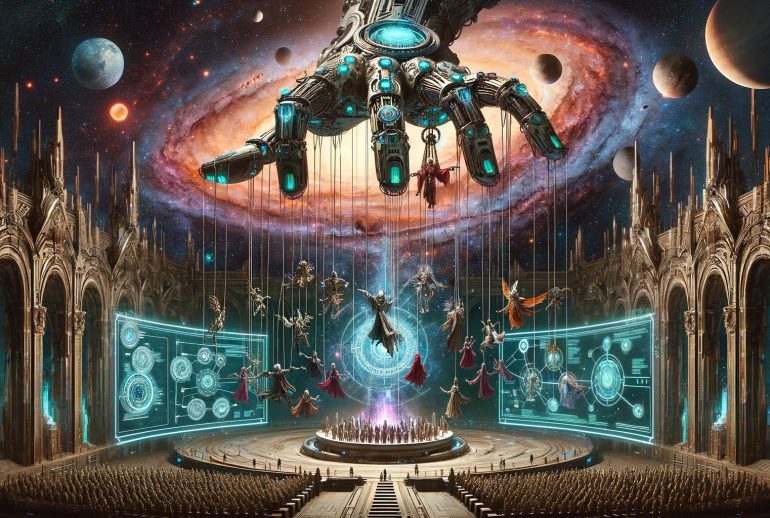In the vast and intricate landscape of storytelling, authors employ various techniques and narrative devices to captivate their audience and breathe life into their narratives. One such device that has intrigued and sometimes perplexed both creators and consumers of literature and entertainment is the “Deus ex Machina.” This enigmatic term has a history deeply rooted in ancient Greek theater. In this comprehensive exploration, we will dissect the Deus ex Machina, delving into its origins, functions, and the debates that surround its use in storytelling.
Unearthing the Origin and Essence
The term “Deus ex Machina” finds its origins in the realm of ancient Greek theater, a theatrical tradition that has left an indelible mark on the evolution of storytelling. Dating back to the works of renowned playwrights such as Euripides and Aeschylus, this narrative device was a product of theatrical necessity and dramatic convenience. In its theatrical context, Deus ex Machina represented the dramatic device whereby a divine figure or an external force would intervene to resolve intricate and seemingly unsolvable plot dilemmas.
The primary function of this intervention was to provide a swift and often neat conclusion to a play, offering a sense of closure to the audience. However, this theatrical tool simultaneously raised questions about the legitimacy of such resolutions and their impact on the overall storytelling experience.
Function and Identifying Characteristics
A Deus ex Machina solution typically manifests as an abrupt and often improbable resolution to a story’s conflicts or challenges. Several defining characteristics help us recognize this narrative device:
Suddenness: The resolution appears suddenly, often without adequate build-up or foreshadowing, catching both the characters and the audience by surprise.
Lack of Character Agency: Central characters may find themselves with little to no influence on the resolution, as it is primarily driven by external forces or unforeseen events, such as unexpected interventions.
Convenience: Deus ex Machina solutions conveniently tie up loose ends, resolve conflicts, and provide a tidy conclusion to the story, sometimes without requiring the characters to make difficult choices or face the consequences of their actions.
Improbability: The resolution may rely on improbable or magical elements that defy the established rules and logic of the story’s world, challenging the suspension of disbelief.
Minimal Emotional Impact: Due to its sudden and often disconnected nature, a Deus ex Machina solution can lack the emotional resonance and depth that character-driven resolutions can offer.
Controversy and Critique: The Deus ex Machina Under Scrutiny
The use of Deus ex Machina solutions has been a subject of ongoing debate and critique among writers, critics, and audiences alike. Common critiques and concerns associated with this narrative device include:
Lack of Artistic Integrity: Critics argue that Deus ex Machina solutions can undermine the artistic integrity of a story by offering a contrived and unsatisfying conclusion that feels disconnected from the narrative’s organic flow.
Robbing Characters of Growth: By providing external solutions to conflicts, this narrative device can deprive characters of opportunities for growth, learning, and development, which are integral elements of compelling storytelling.
Disruption of Immersion: Sudden and improbable interventions can disrupt the reader’s or viewer’s immersion in the story, pulling them out of the narrative and prompting questions about the story’s credibility and coherence.
Feeling of Cheating: Audiences may feel cheated when a story resorts to a Deus ex Machina, as it can give the impression that the author opted for an easy way out rather than grappling with the complexities of the narrative.
Missed Opportunities: Using this device may lead to missed opportunities for exploring deeper themes, character arcs, and the profound consequences of characters’ actions.
The Role of Deus ex Machina in Modern Storytelling
In contemporary storytelling, the use of Deus ex Machina solutions is generally discouraged, particularly in literary and cinematic works that aspire to depth, complexity, and emotional resonance. Modern writers often prioritize character-driven resolutions, thematic depth, and emotional impact to create conclusions that feel earned and genuinely satisfying.
Yet, there are instances where the Deus ex Machina is intentionally employed for specific purposes, such as satire, parody, or as a deliberate stylistic choice. In these cases, it serves as a tool to subvert expectations, challenge conventions, or highlight the artificiality of the story, providing a unique storytelling experience.
Conclusion: The Place of Deus ex Machina in the Tapestry of Storytelling
The Deus ex Machina, with its rich historical origins and intriguing functions, occupies a distinctive niche within the realm of storytelling. While it boasts a legacy that can be traced back to ancient theater, it is generally viewed as a less favored narrative device in contemporary storytelling. Modern authors often prioritize resolutions that feel earned, where characters grapple with the consequences of their actions, make impactful choices, and undergo transformative journeys.
Yet, the use of the Deus ex Machina remains a subject of ongoing debate, with its appropriateness contingent upon the goals, style, and intentions of the storyteller. As authors continue to explore the boundaries of narrative creativity, the Deus ex Machina, with its unique capacity to challenge, provoke, and surprise, will persist as a thought-provoking and occasionally polarizing element in the ever-evolving tapestry of storytelling.



